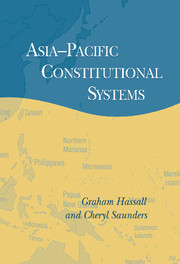Book contents
- Frontmatter
- Contents
- Acknowledgements
- Map: The Asia-Pacific Region
- Introduction
- Part I Modernity and Nation-States at the Dawn of the Global Era
- Part II The Constitution of Modernity
- 4 The legislature
- 5 Representation
- 6 Head of state
- 7 Constitutional revision
- Part III Democracy and the Rule of Law
- Conclusion: Postmodernity and constitutionalism
- Appendix: Chronology of constitutional events in the Asia Pacific
- Bibliography
- Index
7 - Constitutional revision
Published online by Cambridge University Press: 09 October 2009
- Frontmatter
- Contents
- Acknowledgements
- Map: The Asia-Pacific Region
- Introduction
- Part I Modernity and Nation-States at the Dawn of the Global Era
- Part II The Constitution of Modernity
- 4 The legislature
- 5 Representation
- 6 Head of state
- 7 Constitutional revision
- Part III Democracy and the Rule of Law
- Conclusion: Postmodernity and constitutionalism
- Appendix: Chronology of constitutional events in the Asia Pacific
- Bibliography
- Index
Summary
Chiba describes the constitutional experience of Asian legal systems as the coming together of 'official law' (the legal system sanctioned by the legitimate authority of a country), 'unofficial law' (sanctioned by the consensual practice of some group within or outside a country) and 'legal postulate' (a value principle or system serving to justify and orient either unofficial or official law, which gives unique identity to the body of law). When divergence between official law and customary values and practices becomes too great, some accommodation will occur, either negotiated or more revolutionary. This schemata seems plausible in a general sense and assists in understanding a tendency for the peoples of new nations to amend their constitutions, sometimes drastically, within a generation of their establishment.
There have been few exercises in constitutional reform in the Asia Pacific, and their success or otherwise is difficult to assess. In fact, a survey of reform efforts in the region suggests that exercises in complete constitutional revision appear to have failed to achieve their objectives more often than they have succeeded. A number of regional countries have swung between presidential and parliamentary forms of government, on each occasion striving to extricate themselves from the worst effects. Pakistan, Sri Lanka and South Korea have tried both systems. Bangladesh and Pakistan have established parliamentary forms of government after experiencing periods of harsh military rule.
In Nepal, similarly, the parliament was established under a prime minister following the creation of a parliamentary democracy in 1991.
- Type
- Chapter
- Information
- Asia-Pacific Constitutional Systems , pp. 141 - 166Publisher: Cambridge University PressPrint publication year: 2002



